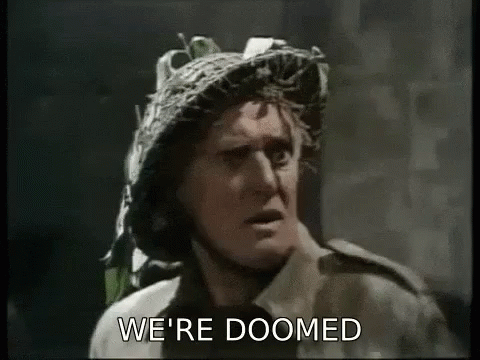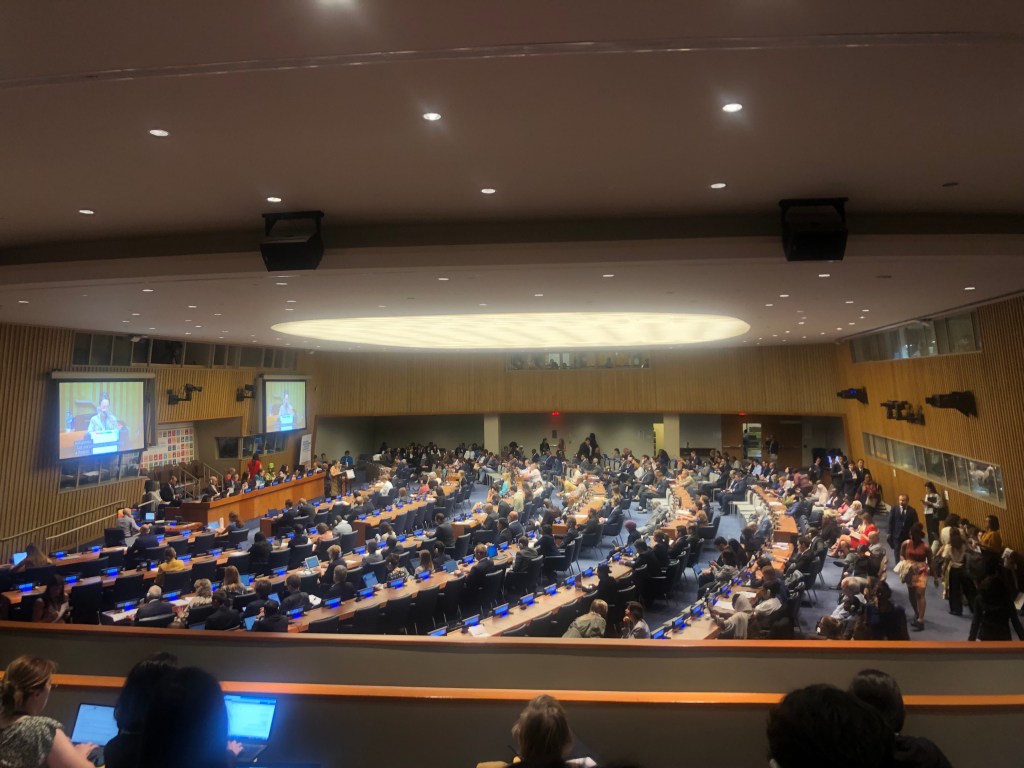I recently spent a few days in New York City to attend the latest United Nations (UN) High Level Political Forum (HLPF). This event was focused on a subset of the Sustainable Development Goals (SDGs) and how the world is progressing toward achieving these goals (spoiler alert: not at all or not fast enough).
This was my first trip to New York since 1996. Some things were the same as then – Tom Cruise was still on Times Square billboards, in 1996 it was for Jerry Maguire, in 2023 it was Cruise driving off a cliff edge for the latest Mission Impossible. Perhaps the most long-lasting cultural legacy of Jerry Maguire has proven to be the “Show me the money” (NSFW) scene. In 2023, the UN sessions sounded similar, with near desperate calls for funding to fix the world’s problems before we all, metaphorically for some and literally for others, fall off the cliff. So, is achieving the SDGs, in fact, Mission Impossible?
The Outsider(s)
Based on my level of access, I basically spent the morning of the four days I attended watching from the gallery as the HLPF discussed topics. Day one was in the famous General Assembly room, the other days in a smaller conference room:
I will do a separate post on my reflections on the UN experience, and I will instead attempt in this post to just summarise some of the more interesting points from the sessions.
The three afternoons, for me, were attending the “Learning, Teaching and Practice” side event – which I spoke at on one day – plus an additional lunchtime event which took place to launch a new report. Again, I’ll do a separate post of the experience of submitting, resubmitting, and presenting a proposal to this event but will include some of the more interesting content and takeaways in this post.
Whilst this is my attempt at a write-up, daily write-ups were handed out and are available online from IISD (International Institute for Sustainable Development). These are less full of Tom Cruise related wordplay, than this post, and are actually very comprehensive.
Oblivion
As a Brit, especially as a child of the 1980s, there was only thing I could think of walking away from the event:

Indeed, the HLPF event left me largely dispirited and fearing that we may, finally, be facing oblivion as a species. Virtually every session stressed that the SDGs are way off target and there was limited confidence of achieving them without huge effort – the introductory session suggesting only 12% of targets are on track.
Since attending the event, I have watched the aforementioned Mission: Impossible – Dead Reckoning film and the plot, as has been heavily advertised, is that Tom and the gang faceoff against a deadly Artificial Intelligence. What is less well advertised (spoiler ahead) is that the American government (and others) are trying to control this AI in anticipation for, what the film outlines as, a third world war to control our dwindling world resources. Whilst this feels farfetched in some ways, we also have to consider that even if the AI threat is exaggerated the potential for wars over water, oil and other resources are all too real.
The start of the “SDGs Learning, Training and Practice” side event (the event I presented at) suggested that “shocks” such as Covid, war(s) and natural disaster have been negatively impacting the SDG agenda. In reality, given the event was focused on post-covid solutions, we surely face huge challenges given the post-Covid “new normal” is a normalisation of increasingly extreme weather and political challenges. Indeed, the eve of the event had seen horrendous flooding nearby in New York state and extreme temperature warnings in the southern USA, as well as much of the rest of the Northern Hemisphere.
Risky business
Many sessions called for something like we “can’t keep doing same things we have always been doing”. However, there seem to be no easy answers and even if the money/finance models that many sessions were calling for existed there is, of course, human nature to contend with from a corruption and waste perspective. Any investment, be it from an NGO, government, private sector or elsewhere will come with considerable risk unless based on global good practice.
Mavericks
Success stories and concrete ways forward were relatively few and far between, but there are clearly people out there managing to achieve the seemingly unachievable, some of the more interesting examples I made note of:
- The SDG Atlas (https://datatopics.worldbank.org/sdgatlas) was one of the few tables with resources that could pass as “conference stalls”. It looks like an interesting site with access to SDG related data for transparency and comparison.
- Whilst emission targets and other SDG challenges led to advocacy for renewable energy through out the week a number of speeches through the week still made the counter case and asked the world not to throw out gas and to include nuclear as options. Indeed Senegal, expressed a need to use its oil to fund improvements to the poverty situation.
- If looking for mavericks the most impressive speech of the week came from Edward Ndopu, (SDG Advocate, youth representative) who stressed the need for diversity, inclusion of those with disabilities and more in our shared futures. You can see a transcript here.
- Work being done on water access (outlined in this session, which I learned quite a lot from given I am not an expert in this area) and the point made that it needs to go beyond just water – that it makes sense to combine water projects with electricity access projects, etc. This was a good example of where the siloed approach of agencies, NGOs, etc needs to be challenged and many talks called for big picture “whole government” thinking. At the same time there were a number of sessions stressing real success is when local people and governments are empowered as they know their situation best. Overall, getting the balance correct will likely depend on existing government models and the balance between local/centralised. A Swiss diplomat, for example, making the case that the Swiss canton system is local-first and therefore, potentially, in a better position than some countries that over centralised power.
- Fundação Antonio Meneghetti (a school in Brazil) outlined their education model which, whilst not too revolutionary in some ways, at least suggested that young people can be engaged with global issues and be better positioned to deal with world challenges (as well as helping tackle limitations from class/social status).
- I personally liked a presentation from International Movement ATD Fourth World, this session made me think about the language we use. One key point was to consider people as “currently experiencing poverty” rather than calling them “poor” and “temporarily homeless” rather than “homeless”. The point being that these conditions can, and should, change and we should not classify people by them. You suspect this will become increasingly important as more of the world face flooding, fires and other disasters.
- There was minimal mention of standards to ensure quality, but one or two people thankfully did mention them, otherwise you fear the calls for cash will lead to a lot of waste and probably dumping of poor solutions on the countries needing the most help.
- There were some mentions of examples of good work being done, for example Denmark working in partnership with South Africa and India bilaterally on water projects. Similarly South Korea was one of relatively few countries to proactively offer support and data to others during the general HLPF sessions.
- Morocco mentioned desalination as key to their water strategy given climate change, I remember this being the big hope in the 90s. This article suggests it is technology that is finally being used more and more.
- The IFMA Foundation (who I shared a session with) did a really good presentation stressing the impact of building on lives and climate and the need for good facilitates management to help ensure the SDGs are met, including through their membership, education programmes, etc. A good example where an NGO or professional association have a clear link, via their profession, to SDGs and the common good.
- The UN itself was called out for doing enough in a couple of sessions – specifically that peacekeepers do not use renewable energy when deployed and the UN HQ campus lacks solar panels and other tech.
- Finland and others highlighted that investment in energy had been accelerated, in their case due to a decline in access to Russian resources but ultimately to a good result.
- Sweden, interestingly, using Gothenburg as an example to convert a big city into a greener version with lessons to be learned for others (that would seem to be covered here). Nusantara (the planned new capital of Indonesia) was also mentioned as a city being built to be sustainable.
- Some of the delegations handed over their slots to other parties – one advocated for https://www.climateview.global/ as a tool that is useful to tackle funding and capacity challenges.
- https://www.resolve.ngo/healthgrid_sierra_leone.htm– Electrifying healthcare facilities in Sierra Leone, sounded like a really good project to combine water, electricity and healthcare services (I also liked another talk that said to focus on “services” not “access”).
- The hope/potential for global south to develop through local supply chains was mentioned a few times, however, this sounded more aspirational than in place. What was more optimistic was that the tech is largely in place, the challenge is more the delivery due to financing and other resources. This included better deployment of open source solutions. Therefore, plenty of opportunity for learning and capacity building professionals!
After “I Disappear”ed
After leaving the event I did have chance to join “VNR Lab on Multi-Stakeholder Partnerships and Engagement (HLPF 2023 Special Event)” online remotely. This was a slightly odd experience having presented at HLPF just the week before. For this event (https://media.un.org/en/asset/k1v/k1v0qmae5q) discussions were held around how countries are engaging stakeholders in Voluntary National Reviews, reviews that may be presented at HLPF by diplomats but with lots of people working on them in advance. As with a number of the other events, there was a panel, “lead discussants” and contribution from the room.
For engaging stakeholders tips were shared, including from Portugal. Portugal sought to include all of government and all of society in their approach to the SDGs and VNR. It was said that this was leading to a national picture for sustainable development in Portugal with wide involvement and shared ownership.
A technical committee, with thematic structures [subcommittees?], is the approach being followed by the Maldives. The Maldives highlighted a few things still needed, including funding in general and capacity building around data management. A speaker from Tanzania, meanwhile, insisted for a need to focus on who the VNR is actually for and that if the SDGs are to actually ensure no one is left behind. It was a challenging presentation asking if we, globally, are achieving this with our policies and asking if people in villages, people with disabilities, etc. are being involved fully in the processes.
A speaker, with a remit of how the private sector can be involved, highlighted the major issue that the private sector have not been included in VNRs enough. From their perspective (Fiji) they highlighted the need for small and medium sized companies, in particular, to be involved via funding to support growth and success.
Interestingly, given Portugal were invited as an example, there was a point made in the Q&A from the Portuguese private sector, that they were not involved enough. All in all, a sign that it is problem for getting the right people involved, in making people engaged with the SDGs via the VNRs and still a lack of financing.
Show us the money perhaps.
